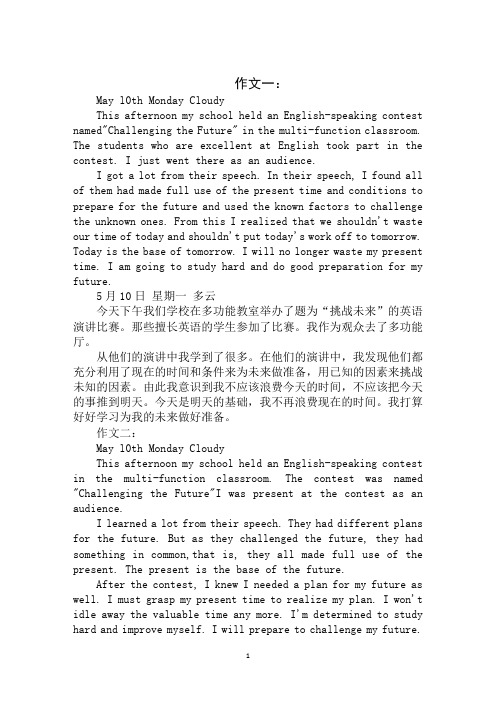Title: The Imperative of Environmental Protection in the Age of Globalization

In the age of globalization, our world is becoming increasingly interconnected. This interconnection has brought about both unprecedented opportunities and unprecedented challenges. However, one thing is certain: environmental protection is no longer an option but a necessity for all humanity to embrace. In this article, we will discuss the importance of environmental protection and the ways it can be achieved through education, innovation, and global collaboration.
Environmental protection is crucial for the survival and well-being of all living beings on Earth. It involves the preservation of our natural habitats, the reduction of pollution and waste, and the conservation of biodiversity. Without adequate environmental protection, ecosystems collapse, air and water quality deteriorates, and human health is compromised. Moreover, environmental degradation has significant economic implications, as industries rely on clean and sustainable resources. As such, environmental protection must be at the forefront of any agenda that seeks to promote global development and prosperity.
Education plays a vital role in fostering environmental awareness and encouraging sustainable practices. By educating children and adults from an early age about the importance of environmental protection, we can cultivate a generation that understands the need for responsible stewardship of our planet. Schools should incorporate lessons on sustainability principles into their curriculum, and parents must also prioritize environmental education within home life. Moreover, governments around the world should invest in public education campaigns that raise awareness about environmental issues and encourage proactive measures to protect our environment.
Innovation is key in solving environmental problems and finding new solutions. Technology offers a range of tools and methods for reducing environmental harm. For example, renewable energy sources like solar and wind power have become increasingly affordable, making them more accessible to individuals and businesses alike. Biofuels derived from plant materials offer an alternative to fossil fuels, reducing greenhouse gas emissions. Additionally, green buildings that use energy-efficient technologies can significantly reduce a building's carbon footprint. Governments and businesses alike must embrace innovation and invest in research and development to find practical solutions to environmental challenges.
Global collaboration is essential in achieving effective environmental protection. Environmental problems are not limited to individual nations or regions; they require collective action across borders. International agreements such as the Paris Agreement aim to limit global temperature rise by 8°C above pre-industrial levels by 2100. These agreements call for countries to take concrete steps towards sustainable development, such as reducing greenhouse gas emissions and promoting renewable energy. Additionally, international organizations like the United Nations Environment Programme (UNEP) play a pivotal role in monitoring and addressing environmental issues globally.
The global community must also recognize that environmental protection is not just a moral imperative but also a strategic advantage for economic growth and development. Countries that invest in sustainable agriculture, renewable energy, and eco-tourism tend to attract foreign investment while simultaneously boosting local job creation and income generation. Therefore, governments must adopt policies that encourage economic growth while protecting the environment. This requires a shift from a focus on short-term profits to a commitment to long-term sustainability, and it requires a rethinking of how we consume, produce, and trade goods and services.
Environmental protection is not a luxury but a necessity for the survival and well-being of future generations. Education, innovation, and global collaboration are essential tools for achieving this goal. By embracing these approaches, we can create a cleaner, safer, and more sustainable future for all. Let us commit to taking action today to ensure that the earth remains a safe and hospitable place for all its inhabitants.


